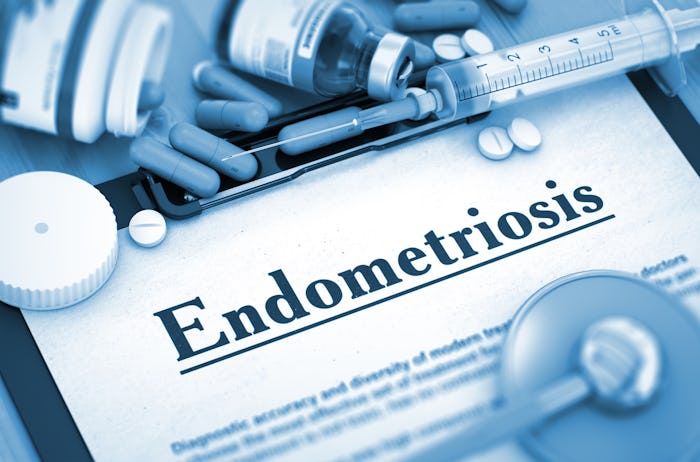Life

Is There A Cure For Endometriosis?
For women suffering from debilitating abdominal cramps, not to mention back and pelvic pain, the question of if there a cure for endometriosis is all too real.
Endometriosis is when the lining of the uterus grows outside the uterus, sometimes forming lesions or scars. The most common symptom is pain, according to the Endometriosis.org, a global forum for the condition. Abdominal cramping is the leading symptom, however, women with endometriosis can experience back pain, intestinal pain, bowel pain, and pain during intercourse. Spotting between periods and heavy periods can also happen. According to Mayo Clinic, the possibility of infertility is a symptom of endometriosis. And doctors don't really know why this is. However, the U.S. Department of Health and Human Services theorizes that endometrial growths can prevent the sperm from uniting with the egg, or that lining of the uterus is not as strong as it could be, thus preventing the potential to carry a baby to term. When it comes to treating the pain associated with endometriosis, your healthcare team with factor in your age, the severity of your symptoms, and whether or not you want to have children.
Unfortunately, there is no cure for endometriosis at the time, according to the United States Department of Health and Human Services. However, there are several types of treatments available depending on the severity of your symptoms. There are three different types of treatment designed to alleviate pain due to endometriosis, according to the U.S. Department of Health and Human Services. They include pain medication, hormone therapy, and surgery.
Pain Medication
Nonsteroidal anti-inflammatory drugs, also called NSAIDS help to relieve pain due to inflammation. According to MedicineNet, these are drugs like aspirin, ibuprofen, and naproxen, which your doctor can prescribe at higher doses than over-the-counter varieties. Opioids are another type of drug prescribed for endometriosis pain. According to Medscape, opioids are narcotic analgesics that affect the central nervous system: in other words, these are powerful and addictive meds.
Hormone Therapy
Hormone therapy like oral contraceptives can help affect how women experience pain associated with endometriosis. Doctors prescribe them in pill form, administer them as an injection, or a nasal spray, noted the U.S. Department of Health and Human Services.
Also the U.S. Department of Health and Human Services noted that hormones like estrogen as well as progesterone and progestin are thought to slow down the growth of endometrial lesions and prevent new ones from forming, but have no effect on lesions that have already formed. These hormones prevent ovulation and also reduce menstrual flow. Gonadotropin-releasing hormone sends the body into a "menopausal" state, preventing ovulation, menstruation, and growth of endometrial lesions. Danazol is another hormone option that stops the release of hormones that occur with menstruation. It should be noted that the U.S. Department of Health and Human Services reported that Danazol can harm a growing fetus and is not recommended for women planning to get pregnant. Many of these hormones have unpleasant side-effects, including weight gain, bloating, acne, headaches, vaginal dryness, joint stiffness, and hot flashes. It's important to discuss how the side effects of hormonal treatments will affect you, and weigh them against the pain associated with endometriosis.
Surgery
According to the U.S. Department of Health and Human Services, different types of surgeries to related to relieving pain associated with endometriosis can leave a woman unable to have children, so it's important to discuss all options with your physician with this in mind.
One of the most common surgeries performed on women with endometriosis is laparoscopy, which is minimally invasive, according to Healthline. After making incisions into the abdomen, a surgeon will use lasers to excise the endometrial lesions and then use intense heat to seal the wounds without using stitches (this is called cauterizing a wound). The surgeon may also remove scar tissue that could be contributing to endometriosis-associated pain.
A more extensive surgery is laparotomy, which is an invasive abdominal surgery. according to Medline Plus. Surgeons seeking to remove larger legions will use laparotomy. Depending on the location of the lesions, surgeons might opt to remove the fallopian tubes, ovaries, and uterus.
The U.S. Department of Health and Human Services noted that surgeons may also ask you if you want to sever the pelvic nerves. However, the The American College of Obstetricians and Gynecologists (ACOG) does not recommend this, stating that this surgery is not included in the management of endometriosis.
The bad news about these surgeries is that even with a hysterectomy, there's no guarantee that the lesions will vanish forever. In fact, the ACOG urges women to be conservative when it comes to treatment of endometriosis because of the longterm affects of surgery, without the guarantee of permanent pain relief from endometriosis.